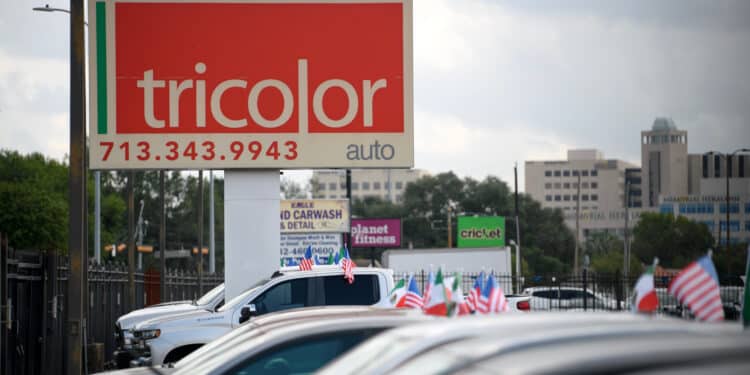As the Department of Justice investigates the alleged fraudulent claims against Tricolor Auto Acceptance, one expert warns that there may not be enough collateral to satisfy the subprime lender’s outstanding debt with all its financiers.
In more common bankruptcy scenarios, assets are liquidated to repay outstanding debt.
“What makes it a little bit more complicated [with Tricolor] is there’s 25,000 creditors in this particular case that have claims here, and some of them have claims against the same collateral,” Brian Bastin, program director for the business and automotive programs at Fort Lauderdale, Fla.-based Keiser University, tells Auto Finance News in this week’s podcast.
JPMorgan Chase, Origin Bank and Fifth Third Bank all had existing warehouse lines with Tricolor and are just some of those in the long list of Tricolor’s creditors.
“In all likelihood, there probably is not going to be enough money to be able to make whole everybody in this particular situation,” Bastin says, noting that there is a pecking order to claims and payments as a result of liquidating the lender’s assets for its Chapter 7 bankruptcy.
“In all likelihood, there probably is not going to be enough money to be able to make whole everybody in this particular situation.” — Brian Bastin, program director for the business and automotive programs, Keiser University
Consumers should be proactive about making sure that any former loans, title liens, service contracts and warranties are properly dealt with to avoid any road bumps down the road.
Join Senior Associate Editor Truth Headlam and Keiser University’s Brian Bastin as they break down the potential implications of Tricolor’s bankruptcy for lenders, consumers and the subprime market as a whole in this week’s Weekly Wrap.
This episode is sponsored by The Work Number by Equifax.
Subscribe to “The Roadmap Podcast” on iTunes or Spotify or download the episode.
Auto Finance Summit, the premier industry event for auto lending and leasing, returns Oct. 15-17 at the Bellagio Las Vegas. Learn more about the 2025 event and register here.
Editor’s note: This transcript has been generated by software and is being presented as is. Some transcription errors may remain.
Thank you truth. I appreciate you having me on the show today. So my prior career, I was actually the general manager of minority operating partner Mercedes Benz. Palm Beach is actually a family dealership. I was a third generation dealer. I’m a proud graduate of the NADA dealer Academy, and currently I am the program director and automotive director at Keiser University, where our mission is to provide the skills necessary for the next generation of automotive leaders to run a successful, ethical and customer centric business.Truth Headlam 11:57:58 Thank you so much for that background. So to kick off today’s conversation, I’m wondering, what are what are your thoughts on all of this that’s going on with tri color?Brian Bastin 11:58:10 Yeah, it’s really an interesting case. There’s a lot going on with it, and really it’s centered around a lot of different things. And usually whenever there’s a crisis or a real problem. It’s not just one thing that kind of manifests itself. It’s usually a series of steps and and certainly there are a series of steps that both went wrong, maybe from a little bit of bad luck, a little bit maybe from a business plan type perspective, that went wrong, and then out and out, what is at least alleged would be fraud if it is actually true. And really, what their business model was is, they’re located in the southwest United States, and they do a lot of business with the sub prime lending. They also do a lot of business with immigrants that may not have social security numbers and the like. And they and actually last year, in 2024 they did nearly a billion dollars worth of loans out there on this Now, historically speaking, sub prime lending has always been a little bit risky and and as such, you have higher interest rates, higher down payments and the like associated with it. And there are losses that are going to happen with that, even in the best of times where we’re going to see that, but what we’re seeing right now in the market is dealers, not just tri color, but dealers in general. Go this goes back to folks covid times, they were really heavily increasing prices on cars, on a new car. Franchises were selling vehicles over list price. Used car prices were very high. Interest rates now, in recent years have gone up, and what’s happening now is a lot of those sub prime loans are starting to default, and we’re starting to see large defaults of that almost about the same numbers that we saw going back to the financial crisis time. So it’s starting to create some issues there with people being able to pay and and certainly from that aspect of it, that’s that affected tri color negatively. It’s also affecting other dealers in a negative capacity, and that might be a little bit self inflicted in terms of what dealers did in terms of pricing post covid And plus, obviously interest rates rising and the light now what tri color is accused of doing is actually would be fraud if it’s proved to be true. And what they do is kind of what they did was, in order to generate more loans, the company needs to generate more capital and get more capital in and they were actually creating a product that very similar to what happened during the financial crisis, which at the Times called mortgage backed security, the broader base called an asset backed security, where they package up all these loans and they do a couple things with them, either they slice them into pieces and saddle. Them, and there’s nothing fraudulent about that. Or what they do is they hold them as collateral to get what’s known as warehouse Financing Loans. And what that essentially means is they go to banks, they get capital so they can either invest in their inventory, or they might have a way to invest in more loans for more people and the like, where the alleged fraud came in here, with this particular case, is they were pledging these assets to multiple banks. So they were actually essentially using this as collateral. They went to banks like JP Morgan and fifth, third and other banks. And that’s something you can do, because you can’t have that collateral pledged out to to multiple banks. So essentially, they were getting loans from all these different lending institutions using the same collateral. And that, of course, is where the the issue came in, yeah.Truth Headlam 12:01:52And so, as you mentioned at the top of your response there, there is a lot to unpack here, and I do understand you kind of likened at least a part of this to the housing crisis more towards the top of the century. And with that, I’m, you know, wondering like, how often does an incident like this actually come about, especially in Auto, and more specifically, to auto. Have you ever seen something like this play out in the past, and if so, how did it end?Brian Bastin 12:02:28 Yeah, so obviously, the charges against tri star are alleged in this particular time, but we do see this in auto in various forms. There’s there’s always been fraud that’s happened in the auto industry, whether it’s been odometer tampering back in the past, whether it’s been washing titles so that you could sell a flood damage or a salvage car, a wrecked car, and make it appear to be a good car. So there are, and have been those items that have happened throughout the years. Now this specific case, you don’t hear of all that that frequently. What? What you would probably hear more frequently would be a dealership that would commit floor plan fraud, which essentially would be they would get on any specific car. They would get different banks to give them floor plan money on those that get the inventory that they have in place, and again, you can’t have it’s a similar type of situation where you can’t have that one asset as collateral getting loans from different sources. So I’d say floor plan fraud would be more common than what’s alleged here, in this particular case, with these asset backed securities and how they were getting the money from the various banks.Truth Headlam 12:03:43 And while it is understood that one thing that is confirmed about this case is that tri color has filed for chapter seven bankruptcy, and so I’m curious, how does that impact what would normally happen when a dealership is trying to close and so and then, I guess within that question, you know, what is the typical process that a dealer takes with their floor plan financing is when they are closing?Brian Bastin 12:04:17 Okay, so to kind of answer your first question, first through the chapter seven bankruptcy, what would happen? Would be assets would be liquidated. Now, what makes it a little bit more complicated here is there’s 25,000 creditors out there, in this particular case, that have claims here, and some of them have claims against the same collateral. So in all likelihood, there probably is not going to be enough money to be able to make whole everybody in this particular situation. And I know that JP Morgan and Fifth Third Bank have actually put out in their regulatory filings, while maybe not specifically naming tri color by name, but they’re actually taking impairments or losses against that right now, because it’s upwards of 200 million, $300 million for the particular bank. So the first thing through the bankruptcy process is for the course to try to determine is what is the pecking order in terms of the claims and who’s going to get paid with the assets for unfortunately, there are significant assets there, because there’s inventory and other things and buildings real estate that it could be utilized here in this particular case. So from a creditor perspective, the courts are going to bet that out based on the bankruptcy laws that are in place now. From a consumer point of view, if you are a consumer with one of these companies, with this company, and you had a situation where maybe you they’re supposed to pay off a former loan that you actually had a trade in, and there was a lien against that, and they’re supposed to pay that off. You should definitely work with your bank, make sure that your bank’s aware of the situation, find out if that lien has been paid or has not been paid, and if not, in order to protect your. Credit you’re most likely going to have to continue to pay that payment on that little car that you traded in. I would also recommend any of those consumers to get it an attorney out there to help them through that process that’s going to be out there. If it’s a titling issue, working with your local DMV would be your best course of action. And they’ll, they’ll help you with that now, in terms of in general, if a company realizes, you know what, I’m in a little bit of trouble, and we may have to go the bankruptcy route, especially when we’re talking about the floor planning side of things, they should really contact that that bank explain the situation to them. A lot of times, what the bank will do is they might offer deferred payments so they don’t have to pay. They got a regular schedule. You also want to make sure that you’re not out of trust. And what we mean by out of trust is you actually have more loans outstanding than you actually have value of inventory. And the bank is going to make sure that they’re going to do floor plan audits, and they’re going to make sure that the car is where it’s supposed to be, etc, and have that there with you. But it’s really getting out in front of this and working with the banks directly and explaining the problem, because after the fact, it’s going to be a lot worse than if you try to get out in front of it.Truth Headlam 12:07:17 Yeah, and I definitely appreciate you know that tidbit about kind of best best practices are next steps that consumers especially can take, and while I personally have not heard any consumers come to the forefront, I’m not sure that those type of concerns have made headlines just as yet. I do understand that could be a very real situation that people can face, either in relation to this tri color situation or otherwise Brian Bastin 12:07:49 correct. It could even be a situation, and I don’t know the specifics of tri colors business, but some dealers, what they’ll do is they’ll sell extended service contracts and extended warranty in common terms, and they might self fund that. So someone might have purchased an extended warranty that would be funded through tri color in this example, and might find out that that coverage is not going to be there. So when it goes bankrupt, that’s another concern. So they want to make sure that customers really need to make sure they’re reading all the documents. Know who’s who’s backing these things. And if you’re going to buy an extended warranty or the likes, you want to make sure that’s going to be with a company that has a really solid rating. You know, it’s going to stand behind that, even if a situation like this happens and the dealer went bankrupt. You know, still know that. Make sure you have your coverages.Truth Headlam 12:08:40
So what can we expect from, you know, possible wider implications or next steps to come out of what’s happening with tri color? I thinkBrian Bastin 12:08:53 you’ll see a few different things with it, the amount of asset backed securities, essentially backed by these loans that are out there is fairly significant. When you’re talking about on a national scale, over $200 billion is out there now, certainly that’s a little bit of a drop in the bucket compared to the mortgage market, which led to the crisis. So I wouldn’t expect some kind of contagion. I know CNN, I kind of had an article about that recently talked about, is there going to be contagion, similar to the mortgage backs here? Now think we’ll get anything anywhere near what that’s going to happen. However, what you might see is you might see lending standards really increase, so it might be a little bit more difficult for people to get loans, especially people that might have sub prime credit interest rates, even though we saw that the Fed yesterday lowered rates, the rates on these loans because they’re riskier, I think that might go up. And I think you might have some higher rates, which might affect affordability issue for people. And by the very nature, subprime people in that category are probably having a little bit harder time than maybe people that have the better credit in terms of affordability stuff. So having higher, higher loan rates, maybe higher fees upfront, all those aspects might make it a little bit more difficult for people to be able to get cars that might possibly need cars. And I certainly think banks are going to be a little bit more diligent. They they were burned 12 years ago, 15 years ago, when the financial crisis happened with the mortgages, and certainly they don’t want to have this happen. And sorry, a little bit of a black eye for some of the big banks out there that are taking significant charges against their earnings. So I think you might see lending standards and things like that get a little bit tighter.Truth Headlam 12:10:38Well, thank you so much, Brian for breaking this down with me, and thank you to our audience for joining us on the road map, and be sure to follow us on x and LinkedIn. Registration is also open for our upcoming auto finance summit 2025 and our power sports finance summit in the fall, which. Is actually taking place next week or later this week, as always, we will see you online at auto finance news.net. Here and next time and again. Thank you to our sponsors, Equifax, lenders who leverage income and employment verifications through Equifax is the work number see a 48% higher likelihood of loans closing.







